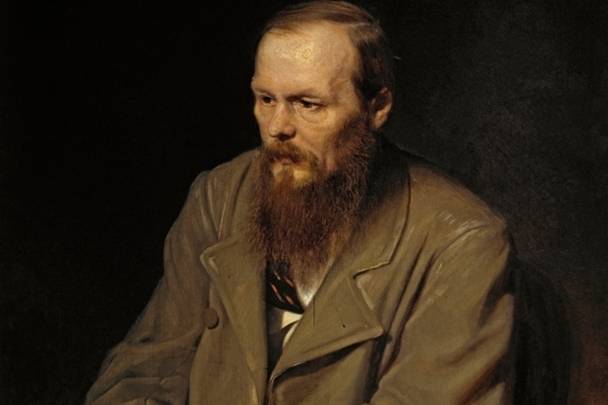Dostoevsky

Dostoevsky is one of the most famous novelists in the world and his work is especially characterised by its exploration of human psychology and the themes of Russian 19th century politics, society and spirituality. His most famous work are the novels Crime and Punishment, The Brother Karamazov and Demons, the novellas Notes from Underground and The Gambler, plus many short stories.
Fyodor Mikhailovich Dostoevsky was born in Moscow's Mariinsky Hospital for the Poor in 1821 where his father worked as a doctor. Dostoevsky showed a love for literature from an early age, but in 1837 he was sent to study at St Petersburg's Nikolaevsky Military Engineering Institute to pursue a career in the military. Despite not liking his time at the institute, he nevertheless completed his studies there and became an engineer. However in 1844 Dostoevsky's first novel Poor Folk received acclaim and proved a commercial success which led to him resigning from his military career.
1849 saw an event in Dostoevsky's life which would have a drastic effect. He was arrested for being a member of the secret Petrashevsky Circle which, although the circle more resembled a literary discussion group rather than an extreme political organisation, led to the author being sentenced to death. The reprieve only came at the last minute when Dostoevsky had been lead out to the firing range. His sentence was commuted to exile with hard labour in Siberia.
Doestoevsky served four years' hard labour in Omsk and later wrote about his experiences in the book The House of the Dead. Upon being released in 1854 he was forced to serve as a soldier in Semipalatinsk (now the Kazakh city of Semey). In 1857 he married his first wife Maria Isaeva in Novokuznetsk before returning to Semipalatinsk. In the same year Dostoevsky was pardoned by the new emperor and in 1859 he was discharged from military service on grounds of ill health. He had been diagnosed with epilepsy and frequently suffered from seizures. He was granted permission to return to Russia and firstly settled in Tver before moving to St Petersburg. Later Dostoevsky travelled around Western Europe where he developed a gambling addiction which, though catastrophic, also forced him to write more to raise funds to feed his addiction.
In 1864 Dostoevsky's wife died and in 1867 he remarried. His new wife Anna Snitkina would later suffer at the hands of her husband's gambling but remained by his side and provided great support in his writing career which at this period was flourishing and at its most productive. In 1871 the couple returned to Russia full time, living in Staraya Russa for a period before returning to St Petersburg in 1878 where he died in 1881. He is buried at the Tikhvinskoe Cemetery of St Petersburg's Aleksandro-Nevskaya Lavra.
Sights connected with Fyodor Dostoevsky:
- Fyodor Dostoevsky Museum-Apartment (Moscow) - apartment in the Mariinsky Hospital for the Poor where Doestoevsky lived from 1823 to 1837.
- Fyodor Dostoevsky Museum-Estate in Darovoe (Darovoe, Zaraisk District, Moscow Region) - estate house of Dostoevsky's father, where Dostoevsky spent summers during his childhood.
- Fyodor Dostoevsky State Literary Museum (Omsk) - located in the Comendant's House which Dostoevsky visited during his exile in Omsk between 1850 and 1854.
- Fyodor Dostoevsky Literary and Memorial Museum (Novokuznetsk, Kemerovo Region) - museum located in the house where Dostoevsky's first wife rented a room.
- Fyodor Dostoevsky House-Museum (Staraya Russa, Novgorod Region) - house where Dostoevsky lived between 1872 and 1878.
- Fyodor Dostoevsky Museum-Apartment (St Petersburg) - apartment where Doestoevsky lived from 1878 until his death there in 1881.